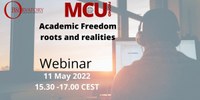Webinar - 11 May 2022 - 1530 - 1700 CET
Date: 11 MAY 2022 from 15:30 to 17:00
Event location: Online event
Type: Special Events

The webinar was one of a series designed to explore aspects of the new Magna Charta 2020 and was the first to be organised in association with the Global Observatory on Academic Freedom.
In a time of extreme polarization where ‘cancel culture’ is an increasing occurrence, the principle of academic freedom is increasingly discussed and debated among those working in higher education. Universities serving society with academic members defending various political and ideological points of views can cause a tension that is sometimes difficult to navigate.
In this webinar, hosted by the Magna Charta Observatory (MCO) in May 2022, panelists Milica Popovic, Julius Weinberg and Maria Kronfeldner discussed academic freedom in the current context.
Popovic, who is the coordinator of the Global Observatory on Academic Freedom (GOAF), provided an overview of the Observatory that is connecting scholars interested in academic freedom and publishing research related to these issues. Following that, she presented highlights on GOAF’s first global report that looked at the changing understanding of academic freedom post-pandemic. Some of the key observations included: the lack of a global framework, monitoring or complaint bodies, as well as little to no enforcement of existing principles and documents that are currently in place; increasing attention to academic freedom may signal a potential crisis; infringements and attacks seem to be more frequent with more court cases currently being brought; and, a look at how we measure academic freedom.
Following that, Julius Weinberg, the former vice-chancellor of Kingston University, London, posed some thought-provoking questions about the limits of academic freedom as well as protections needed to ensure its integrity. He talked about the criticisms of current applications of academic freedom that challenge the very nature of its purpose— that disagreements enable the identification of truth and that it is a process that creates knowledge as a public good. In discussing this, Weinberg also acknowledged that academic freedom feels very different in countries that do not have broad-based freedoms of expression. One of the central questions he posed was if academic freedom should be afforded to those criticizing areas outside of their expertise or specialty.
In response, Maria Kronfeldner of the Department of Philosophy, Central European University, offered her perspective of where the line exists between legitimate critique and infringements upon academic freedom (e.g., cancel culture or no-platforming). She stated that it is important to look at this because academic freedom principles can be abused and legitimate critiques are more and more being viewed as infringements of academic freedom when it is not the case. Not all critiques are restrictions of academic freedom and we need to achieve a better understanding to know how to determine the difference.
Her view was that legitimate criticism is determined by the disciplinary quality standards for scholarly work, by looking at dissertations and assessing them objectively. The arguments and claims, as well as the epistemic goals involved should also be reviewed. It cannot be decided by looking at the person, the topic, or the sheer fact or format of any protest(s). She further clarified that epistemic goals include presenting empirical evidence about facts, providing insight into certain peoples’ experiences. To advocate political attitudes or stances, or provoke controversy for the sake of controversy, are goals where we should draw the line—they are not epistemic goals.